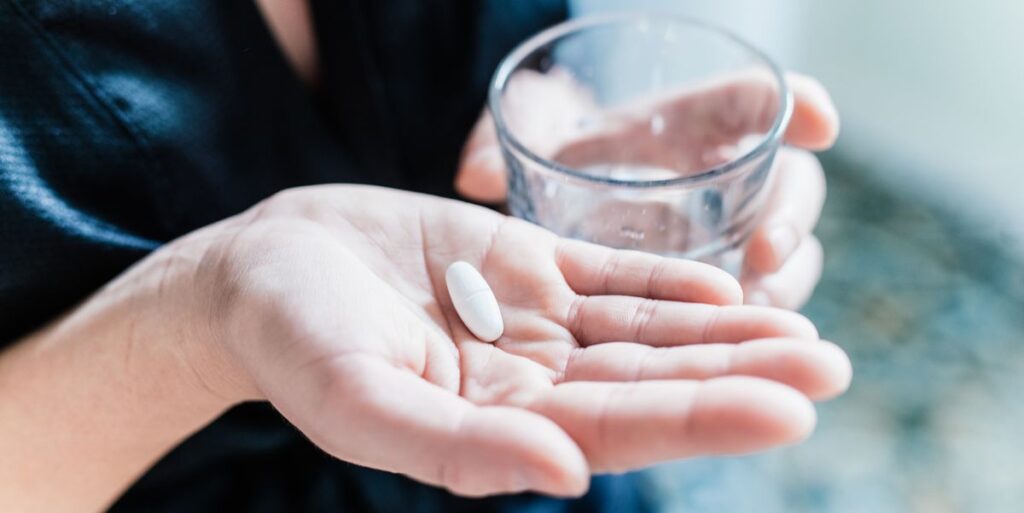Many people take a probiotic supplement to improve their digestive health or stomach issues, yet the benefits can go far beyond that. Research suggests that probiotics, the beneficial bacteria that live in your gut and make up your microbiome, can help strengthen the immune system, improve blood sugar levels and insulin sensitivity, speed up metabolism, assist in weight maintenance, and even alleviate anxiety and depression. If those are benefits you’re looking for (and really, who wouldn’t be), you likely want to know the best time to take probiotics to get the most perks.
Meet the Experts: Mia Syn, M.S., R.D.N., owner of Nutrition by Mia; Janelle Connell, R.D.N., nutrition expert at Viome; Hilary McAllister, senior formulation chemist at Metagenics; Mastaneh Sharafi Ph.D., R.D., SVP of Science and Innovation at Ritual; Stephanie Saletta, M.S., R.D., MyFitnessPal nutrition scientist; Shelley Balls, R.D.N., a registered dietitian nutritionist at Intermountain Health.
Here, nutrition experts share the best time to take probiotics, plus the best foods to take them with, how to add probiotic-rich foods to your diet, and more.
When is the best time to take probiotics?
“Some studies suggest that the best time to consume probiotics is with or after meals,” said Mia Syn, M.S., R.D.N., owner of Nutrition by Mia. “However, the best time of day to take probiotics is not definitively established.” What’s more important than when you take them is that you take them at all.
“The best time to take probiotics is when it’s most convenient for you and when you will remember to take them,” added Janelle Connell, R.D.N., nutrition expert at Viome. “Consistency is key to support probiotic effectiveness and meaningful changes within your microbiome.”
Hilary McAllister, senior formulation chemist at Metagenics, added: “Most clinical studies on probiotics do not control for the time of day and still show good benefits.” The more important thing is making sure to take them every day.
Do you need to take probiotics with food?
Given that they’re digestion-centric, to consider meal time when taking probiotics is natural. But not all brands are created equal, explained Mastaneh Sharafi Ph.D., R.D., SVP of Science and Innovation at Ritual. “It’s always best to follow the directions on the product label,” she said. “Some brands recommend taking their probiotic on an empty stomach, while others suggest taking it with food.”
The experts we spoke to agreed that there’s nothing wrong with taking probiotics with food, and because it’s often recommended, it can’t hurt—unless the packaging instructions advise otherwise. “Taking them before breakfast may be the preferred option, because your digestive system has been at rest for an extended period of time and the probiotic has less resistance reaching the intestines,” said Stephanie Saletta, M.S., R.D., MyFitnessPal nutrition scientist.
On the other hand, taking probiotics with food may also help them survive their digestive travels. Connell explained that the food can act as a protective barrier, “helping probiotics survive stomach acid and harsh bile salts to reach the lower intestines, where they can be most effective.”
Saletta recommended talking with a doctor for guidance on picking the right strain and the right time of day to take it, and also reaching for probiotic- and fiber-rich foods to get similar benefits. “Research has shown that a wide variety of fruits, vegetables, whole grains, and legumes will improve your gut probiotic makeup,” she added.
Foods that you should eat with probiotics
Prebiotic foods, which promote the growth of beneficial microorganisms and are known as food for probiotics, are good to eat alongside the supplement, said Shelley Balls, R.D.N., a registered dietitian nutritionist at Intermountain Health. Prebiotics include onions, bananas, Jerusalem artichokes, oats, lentils, almonds, asparagus, barley, wheat bran, greens, yams, apples, garlic, leeks, soybeans, flaxseeds, seaweed, and cacao.
Foods to avoid with probiotics
Connell and Syn said that to get the most out of probiotic supplements, you should avoid ultra-processed and sugary foods that feed harmful bacteria, as well as artificial sweeteners, alcohol, and fatty, greasy foods that disrupt gut balance. They also recommended avoiding excess alcohol.
Can you take probiotics if you are on antibiotics?
Keiser said it’s best not to take probiotics if you’re also on antibiotics, which can kill off probiotics and reduce their efficacy. “If you’re taking antibiotics, be sure to take probiotics a few hours before or after your antibiotics,” she added.
It’s also important to make sure you are taking a reputable brand that is upfront about their quality and research. Research helps identify and verify the specific health benefits of different probiotic strains and formulations to help ensure that consumers receive safe and effective products. Read the label thoroughly to see what strands of bacteria are present and if the product has been third-party certified.
The bottom line
You should take probiotics consistently, whenever is convenient for you, and a few hours before or after taking antibiotics, if you are on them. Even so: “Probiotics from supplements alone aren’t enough to promote optimal gut health,” Balls said. “Eating a balanced diet that includes prebiotics, probiotics, and a healthy lifestyle can all play an important part.”
Probiotic foods to prioritize include:
- Yogurt
- Kefir
- Sauerkraut
- Tempeh
- Kimchi
- Miso
- Kombucha
- Kvass
- Fermented pickles (no vinegar)
- Fermented onions
- Fermented beets
- Umeboshi
- Traditional buttermilk
- Natto
- Balsamic vinegar
- Fermented soy sauce
- Spirulina
- Fermented olives
- Cottage cheese
- Sour cream
- Fermented fish
Dietary supplements are products intended to supplement the diet. They are not medicines and are not intended to treat, diagnose, mitigate, prevent, or cure diseases. Be cautious about taking dietary supplements if you are pregnant or nursing. Also, be careful about giving supplements to a child, unless recommended by their healthcare provider.
Read the full article here

